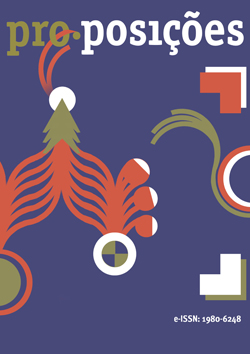Abstract
This bibliographic essay sought to provide arguments for a critical reflection on the relationship teacher–student–knowledge in the context of digital culture. For that, it will focus on the works of Paulo Freire produced after his exile, especially the “Pedagogy of Hope” and the “Pedagogy of Autonomy.” The first work recovers the epistemological bases present in the “Pedagogy of the Oppressed,” while the second one synthesizes the act of teaching in direct dialogue with educators. These contributions allow the reconfiguration of the relationship established between teacher and students around knowledge in the era of digital culture. Beyond denunciation, it addresses the announcement: turning difficulties into possibilities.
References
Barthel, R., Leder Mackley, K., Hudson-Smith, A., Karpovich, A., de Jode, M., & Speed, C. (2013). An internet of old things as an augmented memory system. Personal and Ubiquitous Computing, 17(2), 321-333. https://doi.org/10.1007/s00779-011-0496-8
Beer, D., & Burrows, R. (2013). Popular culture, digital archives and the new social life of data. Theory, Culture & Society, 30(4), 47-71. https://doi.org/10.1177/0263276413476542
Chen, C. H. (2010). Why do teachers not practice what they believe regarding technology integration? The Journal of Education Research, 102(1), 65-75. https://doi.org/10.3200/JOER.102.1.65-75
Clark, L. S. (2011). Digital media and the generation gap. Information, Communication & Society, 12(3), 388-407. https://doi.org/10.1080/13691180902823845
Featherstone, M. (2000). Archiving cultures. British Journal of Sociology, 51(1), 161-184. https://doi.org/10.1111/j.1468-4446.2000.00161.x
Flecha, R.; Gómez, J., & Puigvert. L. (2001). Teoría sociológica contemporánea. Paidós.
Freire, P. (1978). Pedagogia do oprimido Paz e Terra.
Freire, P. (1992). Pedagogia da esperança. Paz e Terra.
Freire, P. (1996). Pedagogia da autonomia: Saberes necessários à prática educativa. Paz e Terra.
Freire, P., & Shor, I. (1987). Medo e ousadia: O cotidiano do professor Paz e Terra.
Gomez, J. (2008). El amor em la sociedade del riesgo: Una tentativa educativa El Roure, 2008.
Gómez, J., Huete, J. F., Hoyos, O., Perez, L., & Grigori, D. (2013). Interaction system based on Internet of Things as support for education. Procedia Computer Science, 21, 132-139.
Grimm, P., Keber, T. O., & Zöllner, O. (2019). Digitale Ethik: Leben in vernetzten Welt Reclam.
Habermas, J. (2019). Teoria do agir comunicativo: Racionalidade de ação e racionalização social WMF Martins Fontes.
Kant, I. (2005). Textos seletos (F. S. Fernandes, Trad.). Vozes.
Koo, S. G. M. (2015). An integrated curriculum for Internet of Things: experience and evolution [Artigo apresentado]. Frontiers in Education Conference, Massachusetts, Washington, DC.
Marcuse, H. (1999). Tecnologia, guerra e fascismo (Maria Cristina Vidal Borba, Trad.). Editora Unesp.
Mello, R. R, Braga, F. M., & Gabassa, V. (2020). Comunidade de aprendizagem: Outra escola é possível EDUFSCar.
Miorandi, D., Sicari, S., De Pellegrini, F., & Chlamtac, I. (2012). Internet of Things: Vision, applications and research challenges. Ad Hoc Networks, 10(7), 1497-1516.
Nida-Rümelin, J., & Weidenfeld, N. (2018). Digitaler Humanismus: Eine Ethik für das Zeitalter der künstlichen Intelligenz Piper.
Ning, H., & Hu, S. (2012). Technology classification, industry and education for future: Internet of things. International Journal of Communication Systems, 25, 1230-1241.
Steinmaurer, T. (2016). Permanent vernetzt: Zur Theorie und Geschichte der Mediatisierung Springer VS.
Sutherland, J. (2008). Directive decision devices: Reversing the locus of authority in human-computer associations. Technological Forecasting & Social Change, 75(1), 1068-1089.
Wolf, M. Paulo Freire und die Kritische Theorie (2016). [Tese de doutorado, Universität Heidelberg]. Arquivo da Universität Heidelberg. https://archiv.ub.uni-heidelberg.de/volltextserver/23682/
Zhang, T. (2012). The Internet of Things promoting higher education revolution [Artigo apresentado]. Fourth International Conference on Multimedia Information Networking and Security, Washington, DC, United States.

This work is licensed under a Creative Commons Attribution 4.0 International License.
Copyright (c) 2021 Antônio Álvaro Soares Zuin, Roseli Rodrigues de Mello


